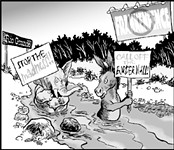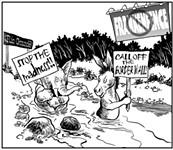Still No Long-Term Housing Plan for Hurricane Evacuees
Only a small fraction of families qualify for mortgage assistance
By Cheryl Smith, Fri., Dec. 16, 2005
That's something – but not much, especially considering that 144,000 households were displaced to Texas alone by Katrina, said John Henneberger, co-director of the Texas Low Income Housing Information Service, an Austin-based affordable housing research and advocacy organization. (Another 256,000 were displaced here by Rita, according to TLIHIS.) And what happens when that one year of assistance runs out, Henneberger asked. "Where's the long-term solution for the evacuees? People need to be able to get on with their lives, and Congress and the administration are making it very difficult for people to do that right now."
There hasn't been enough dialogue at the federal level about long-term situations for low-income families, Henneberger continued, specifically, the ones who won't be able to make rent without help. As a possible solution, affordable housing organizations have called on the government to extend to evacuees HUD's standard Section 8 housing voucher program for low-income families.
Acting Director David Paulison said during a Wednesday press briefing that the agency would comply with a federal judge's recent order to extend from Jan. 7 to Feb. 7 the federal move-out deadline for evacuees still staying in hotels and motels. U.S. District Judge Stanwood Duval ruled Monday that the deadline must be extended because there is no guarantee that FEMA can process all of its requests for additional housing aid by Jan. 7. "We are going to make sure that nobody falls between the cracks," Paulison said. Beyond noting that FEMA has acquired thousands of mobile homes and travel trailers for evacuees, he offered no information about long-term housing plans, however.
HUD Secretary Alphonso Jackson said in a press release about the MAI plan, "We want to help end that hopeless feeling … by letting [evacuees] come back home and concentrate on putting their lives in order without having to worry about making mortgage payments."
Henneberger's take on the plan is quite different, however. "Programs like FHA MAI sound good," he said in an e-mail, "but are based on uncertain and vague press releases and hastily written rules. People need to know what to expect in concrete and guaranteed terms."
Got something to say on the subject? Send a letter to the editor.








